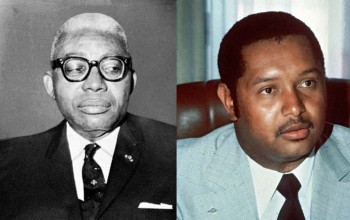Note: This book was WINNER of the National Book Critics Circle Award, WINNER of the Story Prize, and WINNER of the Vilcek Prize in Literature.
“From the front room came the scratchy sound of a needle hitting an old vinyl record. Nina Simone’s sultry yet sorrow-filled voice came blaring out, wailing for us to take her to the water to be baptized. The sorrow soon turned to joy, and the piano gave way to drums as Nina demanded, pleaded, to be baptized….I felt Nina’s drums throbbing in my ears, as though I was marching at the head of a king’s funeral procession, with an entire village in my wake.” – Nadia, from the story “In the Old Days.”
 In this magnificent collection of short stories, Edwidge Danticat always goes straight to the point, but she does so with grace and an honesty that leads each reader to come to new recognitions about life and death, hope and despair, and love and marriage.
In this magnificent collection of short stories, Edwidge Danticat always goes straight to the point, but she does so with grace and an honesty that leads each reader to come to new recognitions about life and death, hope and despair, and love and marriage.
As individuals and families face their lives both separately and together, Danticat’s stories cast an almost hypnotic power over her readers as the characters share their lives while they make decisions about who they are, how much responsibility they have for their own difficulties, and what kind of future they may be creating for themselves and others. There is no easy sentimentality here: Danticat’s tough characters have learned from their experiences that life is hard, and that any sweet memories they have must be treasured for what they are – partly the result of their own behavior and commitments, and partly the result of fate – inescapable, changeable, and often cruel.

Rulers Francois Duvalier (1957 – 1971) and Jean-Claude Duvalier (1971 – 1986) governed Haiti with iron fists until 1986.
In this review’s opening quotation from the story “In the Old Days,” Nadia, a teacher living and working in Brooklyn, receives a phone call telling her that her father is dying in Haiti and would like to see her before he dies. They have never met. Her parents, both originally from Haiti, were married in Brooklyn, where they lived for several years, but when the long dictatorship of “Papa Doc” Duvalier and his son “Baby Doc” in Haiti were over, her father returned to Port-au-Prince to open a Haitian school for poor children. Her mother remained in New York, where, shortly after her husband’s departure, she learned that she was pregnant with Nadia. They never saw each other again. Now, years later, daughter Nadia is asked to come to Port-au-Prince to meet her dying father for the first time. What she learns, while there, about her mother, her father, his large Haitian family, and ultimately, herself, will last her a lifetime.
In “Dosas,” another early story, Elsie, in Miami, receives a phone call from her ex-husband Blaise, whose new wife Olivia has gone to Haiti to visit her family. There she has been kidnapped, her safety dependent on Blaise raising an enormous ransom which he does not have. The story of Elsie’s complex relationship with Olivia, the relationship of both women with Blaise, the respective goals of all the characters, and the atmosphere in Haiti set the tone. Blaise has sought out Elsie as a last resort to ask her for a major part of the ransom money – all part of a scam. Contrasting with this scenario is a subplot involving Gaspard, the elderly man for whom Elsie is a live-in nurse-caretaker. Gaspard has kidney failure, but is reluctant to risk his daughter’s health by accepting a kidney from her, even to save his own life. As Elsie deals with the kidnapping, and Gaspard makes a decision regarding a kidney transplant, the contrasting family situations establish a darkly ironic tone and confirm the themes – life, death, hope, despair, love, and marriage – and the various possibilities for outcomes.
Life for Haitians is often harsh. “The Port-au- Prince Marriage Special” introduces Melisande, a young woman barely in her twenties, who has AIDS, though she has been working as baby-sitter for the child of the owner of the small hotel. Melisande’s difficulties in finding an honest and qualified physician to deal with her illness and to prescribe effective medication, will resonate with readers. Contrasts between the island of Haiti and Miami’s “Little Haiti” appear in “Hot Air Balloons.” Here Lucy, a student in Miami of Haitian background, is the daughter of poor field workers who want only to help her create a new, better life. Her roommate Neah, by contrast, is the daughter of the chairman of the Caribbean Studies department and a woman who is an economist. When roommate Neah, during first semester of her freshman year, responds to an appeal calling for volunteers to work full-time at a rape recovery center in a poor area of Port-au-Prince, she leaves school and flies to Haiti for a week. There she discovers that life is not a romantic vision but a nightmare, thirteen- and fourteen-year-olds who work the streets, young children gang-raped as they trade sex for food. The last story, “Without Inspection,” begins with the line, “It took Arnold six and a half seconds to fall five hundred feet,” as young Arnold, whose life was saved when he came ashore to the US illegally, falls from a construction site. The second-by-second unraveling of his life introduces another whole set of issues for immigrants, legal and illegal, and emphasizes the transitory nature of happiness.

Carole went to the Opa Locka Hialeah Flea Market to obtain eucalyptus leaves and sour oranges for Jeanne’s first post partum bath.
Though the stories described so far are well developed, insightful, and often very moving, it is the last three stories which are the most intense and personally involving. My favorite, “Sunrise, Sunset,” told in seven sections, revolves around Carole, a grandmother who suffers from “blank spots,” which she calls her “lost moments,” brief periods of time for which she has no memory. Her daughter Jeanne, a new mother, is having difficulty with postpartum depression as she tries to plan an elaborate christening in which she has no interest. The rest of the family cares deeply for Carole and Jeanne and wants to help them both, but even Carole is often impatient with Jeanne. “Sometimes you have to shake the devil off you, whatever that devil is,” she remarks. When Carole, one evening, confuses baby Jude with a doll and creates a life-or-death crisis, all the compromises her husband and family have made on her behalf must come to an end, one which every reader will mourn at the same time that they understand.
Edwidge Danticat’s stories, whether set in New York, Miami, or Port-au-Prince, are packed with deep feelings and a recognition of values rarely developed so fully in a short story collection. Compressed and filled with unique, well-developed points of view which show Haiti and its people facing many issues which they either celebrate or mourn, the novel recognizes their endurance at the same time that it shows their hardships in detail. Powerful, unforgettable, beautiful, and ultimately consoling, Everything Inside truly does reveal everything inside Edwidge Danticat’s people and their lives, and it does so with magnificent style and elegant control.
Also by Danticat: THE DEW BREAKER
Photos. The pictures of Papa Doc and Baby Doc Duvalier, who ruled Haiti from 1957 – 1986, appear on https://www.pinterest.com
Little Haiti in Miami is from https://www.eventbrite.com
Waterfront by Jean Guy is found on https://www.medalia.net
Opa Locka Hialeah Flea Market appears on https://www.mccooltravel.com
The author’s photo is from https://www.npr.org
Nine Simone singing “Take me to the Water,” a song featured in the story “In the Old Days,” appears on https://www.youtube.com/



